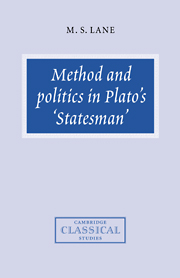Introduction: Method and Politics in Plato's Statesman
Published online by Cambridge University Press: 12 September 2009
Summary
As the discovery of truth and the direction of life are the twofold function of philosophy, so Plato saw a twofold counterfeit of his ideal educator and governor in the professors of wisdom and the public men of his time. The one corrupted inquiry with controversy, the other spoiled politics with faction.
Lewis CampbellA colleague once remarked to me that the Statesman is a ‘very lonely’ dialogue. Interpreters as different as the dean of Anglo-American analytical scholarship, Gilbert Ryle, and a leading Straussian have found it wearying and rebarbative to read. It has won little reflected glory from the analytical attention paid to its companion the Sophist in the last thirty years. Some have taken it to be mainly a discourse on the method of division, itself a procedure of dubious import, and in any case presented more fully in the Sophist, Philebus and Phaedrus. Others consider it essentially a discourse on political theory, though pallid beside the poignancy of the Apology and Crito, the vitriol of the Gorgias, the grandeur of the Republic, the monumentality of the Laws. Seldom have studies of the method and politics of the dialogue been combined in more than a consecutive way. This book explores their intimate connection.
Both the method and the politics of the Statesman hinge on the question of the authority of political expertise and how it is to be distinguished from rival forms of expertise rampant within the city.
- Type
- Chapter
- Information
- Method and Politics in Plato's Statesman , pp. 1 - 12Publisher: Cambridge University PressPrint publication year: 1998
- 1
- Cited by

